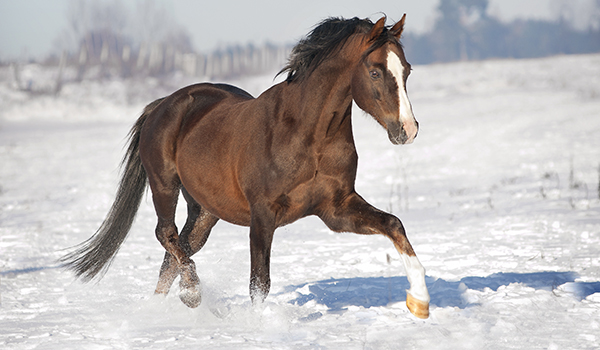
Under normal conditions, beneficial bacteria (think of them as “good bugs”) live in the horse’s intestinal tract. They help break down fibrous material and produce fatty acids that provide energy. If nothing interferes with these beneficial bacteria, they do their job and digestion proceeds normally.
Unfortunately, many things in life can upset the status quo in the intestinal tract – including an abrupt change in feed, stress from training and/or travel, or a course of antibiotics. When that happens, the good bacteria die off, releasing endotoxins and other toxic substances into the bloodstream. At the same time, opportunistic bacteria – which are always present but usually in small numbers – reproduce and take advantage of the flora change. Among the byproducts they produce is lactic acid, which can cause gastrointestinal disturbances. Change in normal flora typically increases the amount of gas present within the large colon which can lead to gas colic or spasmodic colic.
Some horse owners feed probiotic supplements (also known as “direct-fed microorganisms”) in an attempt to maintain the population of good bacteria in the gut. These supplements introduce live bacteria such as lactobacillus, enterococcus, bifidobacterium, saccharomyces and more into the horse’s gastrointestinal (GI) tract.
With stress and significant changes, we as veterinarians recommend supplementing with probiotics to help offset the drastic changes that are bound to occur.
A tremendous amount of supplements are available, and it is important to know which will be the most beneficial to your horse. Supplements that contain the normal equine flora (species specific) are important to consider as well, as the way they are administered to the horse and the dosage. The most powerful probiotics are still “alive” and are able to colonize within the hind gut – thereby increasing the efficacy of the probiotic overall.
The amount of bacteria present within individual supplements is measured in CFUs (colony forming units). The number of CFUs administered orally must be significant enough to reach the large colon and populate the gut while remaining alive. This is one thing to pay attention to while making your purchase along with the type of bacteria your administering.
If you’re ever concerned about your horse’s overall GI health, please contact a veterinarian for further advice. When supplemented correctly, probiotics can be a great way to improve your horse’s overall health.
The Cheshire Horse is giving away a 90-day supply of probiotic supplements: enter to win. (GIVEAWAY CLOSED)

Isn’t it so interesting that animals, as well as humans, need these probiotic bacteria! I am surprised to read that lactobacillus and bifidobacterium are good for horses since they are milk-based bacteria and not natural in the diet of an adult horse.